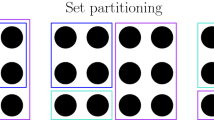Abstract
In this paper, an approach to implement automated auctions as a negotiation mechanism for Business-to-Business electronic commerce applications is presented. It is based on Genetic Algorithms (GAs) that evolve FSMs (Finite State Machines). Each of these FSMs represents an auction strategy that competes on the market and is modified over time according to the outcome of this competition by using GA principles. The paper gives an overview of auctions, especially in the Business-to-Business domain, and other work related to this paper. Then, the application of Genetic Algorithms to automate auctions is presented and relevant details on the prototype implementation are given. In addition, some key results obtained from experiments using this implementation are discussed.
This work is supported, in part, by grant no. La1061/1-2 from the German Research Council (Deutsche Forschungsgemeinschaft, DFG)
Access this chapter
Tax calculation will be finalised at checkout
Purchases are for personal use only
Preview
Unable to display preview. Download preview PDF.
Similar content being viewed by others
References
Wolfgang Banzhaf, Peter Nordin, Robert E. Keller, and Frank D. Francone. Genetic Programming-An Introduction: On the Automatic Evolution of Computer Programs and its Applications. Morgan Kaufmann Publishers, 1998.
J. E. Hopcroft and J. D. Ullman. Intrduction to Automata Theory, Languages and Computation. Addison-Wesley, 1979.
Manoj Kumar and Stuart I. Feldman. Business negotiations on the internet. Technical report, IBM T.J. Watson Research Center, 1998.
MIT Media Lab. Marketmaker. http://maker.media.mit.edu/.
J. R. Oliver. On Artificial Agents for Negotiation in Electronic Commerce. PhD thesis, The Wharton School, University of Pennsylvania, 1996.
M.T. Tu, F. Griffel, M. Merz, and W. Lamersdorf. A Plug-In Architecture Providing Dynamic Negotiation Capabilities for Mobile Agents. In K. Rothermel and F. Hohl, editors, Proc. 2. Intl. Workshop on Mobile Agents, MA’98, Stuttgart, Lecture Notes in Computer Science. Springer-Verlag, 1998.
M.T. Tu, E. Wolff, and W. Lamersdorf. Genetic Algorithms for Automated Negotiations: A FSM-based Application Approach. In Proceedings of the 11th International Conference on Database and Expert Systems Applications (DEXA 2000)-e-Negotiations Workshop, 2000.
Author information
Authors and Affiliations
Editor information
Editors and Affiliations
Rights and permissions
Copyright information
© 2000 Springer-Verlag Berlin Heidelberg
About this paper
Cite this paper
Wolff, E., Tu, M.T., Lamersdorf, W. (2000). Using Genetic Algorithms to Enable Automated Auctions. In: Bauknecht, K., Madria, S.K., Pernul, G. (eds) Electronic Commerce and Web Technologies. EC-Web 2000. Lecture Notes in Computer Science, vol 1875. Springer, Berlin, Heidelberg. https://doi.org/10.1007/3-540-44463-7_34
Download citation
DOI: https://doi.org/10.1007/3-540-44463-7_34
Published:
Publisher Name: Springer, Berlin, Heidelberg
Print ISBN: 978-3-540-67981-3
Online ISBN: 978-3-540-44463-3
eBook Packages: Springer Book Archive




